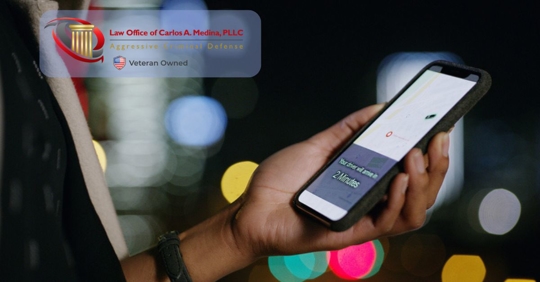Using Digital Data in DUI Defense: How Technology Can Help Your Case
Getting charged with a DUI can feel overwhelming. But today’s technology offers new ways to support your defense—using data you might not expect. At the Law Office of Carlos A. Medina, PLLC, we look closely at digital evidence that could make a difference in your case.
Ride-Share Receipts as Proof of Where You Were
When facing DUI charges, ride-share receipts can tell an important story. These receipts include exact times and locations that show where you were when the alleged offense happened. Having a clear timeline from these records can help confirm you weren’t driving. Plus, messages within the ride-share app can demonstrate your intention to get home safely without driving under the influence.
Situations Where Digital Evidence Can Make a Difference
Not every DUI case turns on a breathalyzer reading. Sometimes, what really matters is where you were, what you were doing, and whether you were even driving at all. That’s where ride-share receipts, GPS data, and other digital breadcrumbs can come into play.
Proving You Weren’t the Driver
If you're accused of DUI but weren’t behind the wheel, ride-share receipts or GPS logs from your phone can help back that up. Maybe you used an Uber to get home after a night out, or someone else had your car. Showing you weren’t in control of the vehicle when the alleged DUI occurred can be a powerful defense.
Fixing the Timeline
DUI charges often hinge on timing. Officers and prosecutors may build a case around when they believe you were driving. But if you have a timestamped Uber receipt, a social media post, or a credit card transaction that places you elsewhere, that timeline can start to fall apart.
Arrested After Leaving the Vehicle
In some cases, a person is approached or arrested after they’ve already parked or walked away from a vehicle. If police assume you were driving but you had already gotten out—or never drove at all—GPS data from your phone or car could help clarify the sequence of events.
Questioning Probable Cause
If an officer pulls you over without clear signs that you were driving under the influence, any extra detail matters. Digital data—like a recent ride-share trip—can help your defense attorney challenge the legal grounds of the stop or arrest.
Showing Intent to Act Responsibly
Even if you had been drinking, taking a ride-share home instead of driving can demonstrate responsibility. That won’t necessarily stop charges if you were still caught driving, but it can help in plea negotiations or at sentencing. Courts do pay attention to actions that show good judgment.
Establishing an Alibi
In cases where someone is accused of DUI hours after the alleged driving took place—or where the case is built on later statements, surveillance, or witness reports—GPS history from your phone or vehicle could be the strongest evidence of your actual location at the time.
GPS Data That Supports Your Alibi
Cars today often have GPS systems that track trips in detail. This data can confirm your whereabouts before, during, and after the time of your arrest. Smartphones also log location history, providing an additional layer of evidence. Showing that your phone’s GPS places you somewhere else can challenge the prosecution’s claims and build a stronger defense.
Digital Footprints That Establish When and Where
Your social media activity—posts, check-ins, and photos with timestamps and geotags—can help recreate your location timeline. Banking and credit card transactions also leave timestamps showing where you were at key moments. Together, these digital footprints form a powerful alibi, showing you weren’t behind the wheel while impaired.
Legal Issues Surrounding Digital Evidence
Handling digital evidence requires care. Privacy laws must be respected, and the data must be verified to avoid problems in court. Defense attorneys must ensure the digital evidence is authentic and properly collected. Challenging the prosecution’s version of events with credible digital proof can shift the case in your favor.
Technology and the Future of DUI Defense
Technology keeps evolving, giving defense teams more tools to work with. From advanced data retrieval methods to AI analysis, new techniques help uncover facts that can protect your rights. Courts are also increasingly recognizing digital evidence as reliable, which means it will play a bigger role in defending clients facing DUI charges.
Facing DUI charges in Tucson? The Law Office of Carlos A. Medina, PLLC is ready to explore every possible defense, including digital data, to protect your future.
Call (520) 251-9561 to discuss your case and see how technology might work for you.

